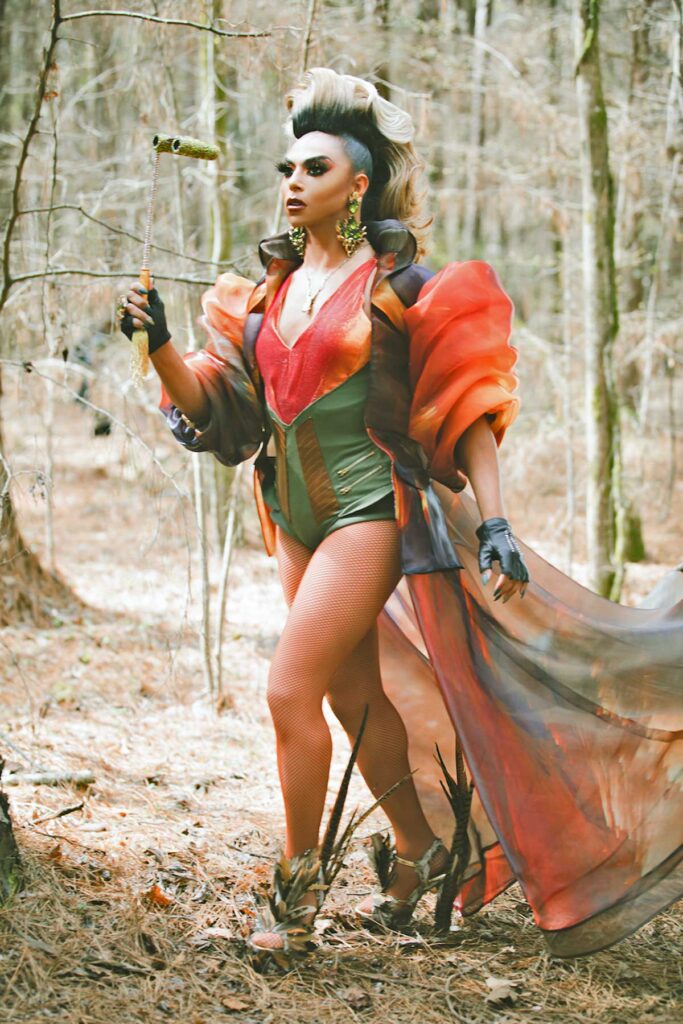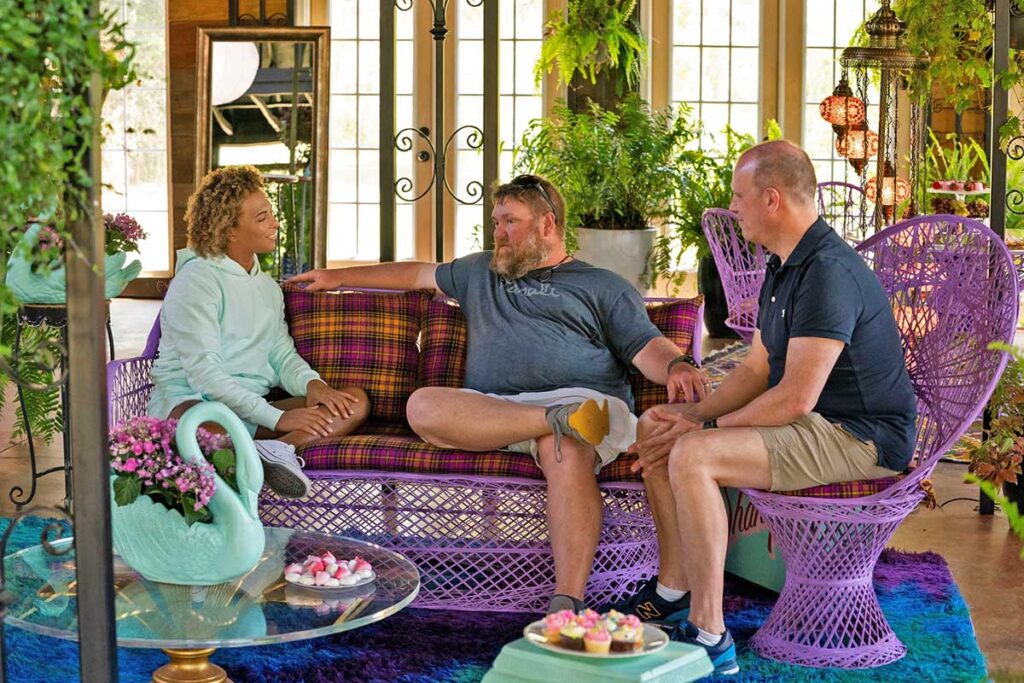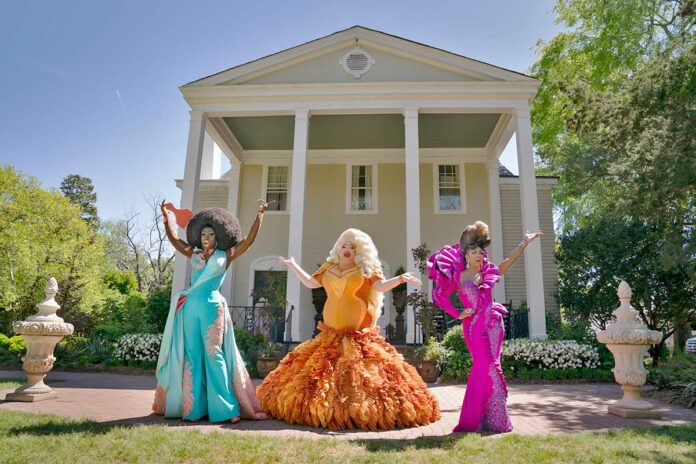You can’t keep Shangela down. Seriously, she came back to “RuPaul’s Drag Race” three times. And now, along with co-stars Bob the Drag Queen and Eureka O’Hara, she’s back for Season 2 of HBO’s “We’re Here.”
Even when COVID-19 brought the production of the real-life series to a halt during its final episode of its first season, it was months before the drag trio could find themselves back in Spartanburg, South Carolina, to finish prepping their drag kids for their on-stage debut. But in true form, by the time Shangela and the crew returned, it wasn’t to hastily cobble together a disrupted season finale — it was with an Emmy Award nod and a second season secured. As Shangela herself would say: “Halleloo!”
On Oct. 11, Season 2 of “We’re Here” returned to HBO featuring dozens more stories of self-expression, actualization, and discovery through drag. The unscripted series has earned its reputation as a tear-jerker, but never at the expense of the small-town America residents it highlights.
During a call she took from her aunt’s house in Paris, Texas, Shangela reflected on the unique insight her own small-town background has given her on “We’re Here,” why it seems like drag can get anyone to open up, and how the show has given her “an even greater sense of purpose.”

“We’re Here” is a show that visits conservative small towns across the U.S., which many LGBTQ+ people might find to be intimidating places to visit. But this season you traveled to your home state of Texas. Did that feel like a homecoming?
Well, I feel like it’s such a gift for me to be a part of show like “We’re Here,” because the show goes across the U.S. to conservative towns that don’t really have a huge visible queer presence. And I’m like, “Oh, small conservative town in the U.S.? Didn’t have a queer presence? I grew up in one.”
I always think it would have been so awesome when I was a kid coming up to see this kind of visibility for artists, drag artists, queer artists just going to small towns and showcasing those particular kinds of stories. So, I think this show is really a huge gift. And when we were able to visit a town in Texas, Del Rio, I was like, “Oh my gosh, totally. Homecoming.” Because there’s just something about being a Texan and the experience in Texas. And then layer that in with the Black experience in Texas, the queer experience in Texas — it’s something that really unites a lot of us.
You did one show this season in Evansville, Indiana, and a man came up to you with a gun on his hip. But even though he looked intimidating, he loved everything that “We’re Here” is doing. Despite your comfort with conservative small towns, do you ever feel nerves when talking about drag in these communities?
I think it’s really interesting you bring up Evansville, because that moment outside of the fireworks store just reminded us that even those of us in the queer community, we get stereotyped so much. We meet people and go, “Have you ever come to a drag show?” And they’re like, “No,” and we’re like, “Oh, do you know what drag queens are?” And they have the worst stereotypes sometimes of what their perception of who a drag queen is. And when that guy walked up it reminded me that even us as queer people, we have stereotypes about other people that we feel might be outside of our community.
A lot of times people say to us, “Oh my god, you’re going to a small town? You poor things. Are you going to be safe? Do you have security? Those small-minded people who don’t support [us].” And then watching the show you learn that you can’t stereotype a town because it’s a small town or because it’s labeled even a small conservative town. And this show definitely shines a light on what the queer experience is like in a lot of these small towns but also the hope that we have that people can change, that the ways of thinking are evolving and the amount of inclusion can be increased if we really go out there and unearth the pockets of support in some of the most unlikely places.
What do you think about drag is so disarming that it makes people open up?
The art of drag is not just about the showmanship of it. Because a lot of people think, “OK, I’m getting in drag: wig, makeup, dress, outfit, heels. OK, I’m a drag queen.” Drag is actually a very cathartic process because you’re breaking down the stereotype or the box that the world may have put you in [or] that you may have put yourself in. And you’re allowing yourself to expand, and you’re allowing yourself to do something that’s uncomfortable, a lot of times, to you. That’s something that our drag kids are going through.
A lot of times they’re like, “I’ve never done this before; I didn’t know it was this much work.” And even in preparing a show for the stage in front of a community of people that they don’t know if they’re going to support them or not, you know, it’s very unsettling to them. But doing something that makes you afraid can a lot of times be very empowering to you, because when you’re able to go through the fire as opposed to walking around it, you come out a stronger person. And that’s what this show does. It inspires strength and courage and love for oneself through their ability to make the leap and become a drag entertainer.

Does “We’re Here” ever cause you to reflect on your own start in drag?
Whenever I’m working with my drag kids, it’s always a nostalgic moment to me. Because for most of them, it’s their very first time ever being in drag and ever putting on heels, ever putting on a wig, ever putting on a show number. And they’re learning as they go along that drag is not as simple [laughs] as they think it is. But it does offer this great moment of power and strength and excitement.
It reminds me and makes me very nostalgic of when I was baby Shangie and doing it for the first time and just getting that love of not only being on stage but understanding as I continued to grow in drag what it meant. See, my job, in a very short amount of time, is not only to connect with my drag kids and allow them to share their story to work with them emotionally — whether it’s a breakthrough or revisiting some very hard experiences they wouldn’t want to revisit — but it’s about telling the story and sharing so it unifies us and connects us.
But in addition to that it’s about preparing them for the stage and teaching them that drag is not just about the exterior. Every time you step on the stage is a moment for you to inspire others and connect with others. It’s a moment for you to teach them and educate them about what the drag community is all about.
What do you hope your drag kids will take away from this experience?
My [drag] kids, I want them to feel so prepared and so ready for the moment that they can go out there and they can shine and feel like, “You know what? My momma Shangie prepared me for this. She taught me that it’s not just about, ‘OK, I listened to the song.’” No, baby. You learned the song. You learned the song so well that the people feel it’s coming from your soul, because when we create a number, we are not creating just a little ditty. It’s about telling a message and representing all the pain and all the struggles and all the things you had to overcome in your life. You made it to this point. There is someone out in that audience who is afraid to look at themselves in the mirror, to experience the hardships of life, and then have the hope that it can get better and work toward it. There are people who can’t do that, so you have to represent that on this stage tonight, and do it as a drag queen, so that they know that also who you are does not define who you can be in this world. And in this moment in drag, baby, you are becoming. As Michelle Obama says with the book, honey: “Becoming.” You are “becoming” the drag entertainer that you have created for yourself.
Was there a moment during filming where you thought, “We’re really making a difference in this person’s life”?
Oh my god, every episode. “Every” episode. That’s why I’m so excited for people to see “We’re Here” and experience the second season because, you know, Season 1 we had six episodes. Season 2 we have eight, so we’re telling even more stories. And when I tell you every one — and not just mine [but] Bob’s, Eureka’s — every story is like, bam, bam, bam! That’s why so many people are moved to tears in watching the show, because you find this moment of connection. Because no matter what community we’re from, we all know what it feels like to be isolated or to feel discriminated against just for being who you are. There’s so much fear in our world because, especially in America, we live in a place where [LGBTQ+] people have not always been supported and accepted. And a lot of times those of us who live in larger cities or places where there is a huge gay community of support, you forget that there are still these places where people are afraid to even say “gay” out loud for fear that they may be discriminated against, beaten, bullied, looked down upon.
Your positivity is infectious, but how do you find the energy to keep it up in communities where queer identities are not encouraged?
I’m gonna tell you: One part of it is I love drag. I love being a drag entertainer and I love being able to share that with people — especially those who have never had the touchpoint before, right? I’m like, “All right, just wait, baby, you gonna see Shangela; we gonna turn it out.” In addition to that, though, this show has given me an even greater sense of purpose.
“RuPaul’s Drag Race,” I loved being a part of that show, but it was a competition show. You go in, you compete, you’re hoping for a cash prize. And it’s allowed me to be able to travel the world and connect with so many people around the world in performing. This show is different because it gives me this greater sense of real purpose in life. There is no prize that we’re competing for; we’re just working to help amplify voices of people who don’t get to tell their story very often but deserve to have their stories told. And it allows us, I think, as a community of queer people, to hopefully feel more strongly united in a world where we’ve had to be socially distant over the last year and been able to get together, whether it’s for Prides or just, heck, birthdays, to get to celebrate each other and be like, “Yes, bitch!”
You know, it’s cool to get to be a part of a show that reminds us of the importance of having a community and remember that everyone doesn’t get that opportunity. So, when you see somebody, lift them up. Don’t try to push them down. There’s enough in the world trying to do that already.

